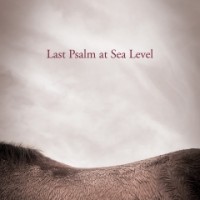‘Last Psalm at Sea Level’ by Meg Day

Author: Douglas Ray
March 31, 2015
Gloria Anzaldua, Chicana critic and author of Borderlands / La Frontera, says, “The answer to the problem between the white race and the colored, between males and females, lies in healing the split that originates in the very foundation of our lives, our culture, our languages, our thoughts. A massive uprooting of dualistic thinking in the individual and collective consciousness is the beginning of a long struggle.” Anzaldua argues against the limitations and divisiveness of “either…or…” thinking in favor of the possibilities and inclusiveness of “both…and…” thinking. Reading Meg Day’s stunning debut, Last Psalm at Sea Level (a 2015 Lambda Literary Award Finalist for Lesbian Poetry), is to embrace the confluence of multiple identities in indeterminate spaces and to love the Whitmanic multitudes that work in each of Day’s songs.
These poems are fearless and energetic, challenging concepts of masculinity / femininity, ability / disability, sickness / health, belonging / exile. The idea, though, that Day opens with is that of loneliness, established by the epigraph from Olin Ivory: “Who can face the sea and not inherit its loneliness?” And with loneliness comes longing, as in the first poem: “I am not praying. / I’m longing. Please.” After she describes a frozen, “working / class winter,” she ends with a command that is both full of longing and has the weight of prayer: “Come home. Come home.” That imperative mood—the mood of commanding—is mastered by Day throughout this book, and—wow—the power that the poet wields! Here are just a few examples of Day’s arresting authority: “Hush up now & listen: the crowning is unmistakable. / Hear the arch in their backs” (“Crying in the Lea”) or “Sit on the floor with me / & dial my frequency; station me static witness & open / my listening” (“Sit on the Floor with Me”) or “Lord, call up the flies. Exhale them / in hot droves” (“Psalm for July”).
One of Day’s most searing poems is her queering of John Donne’s Holy Sonnet “Batter My Heart Three Person’d God.” The whole book, with its psalms, hymns, prayers, confessions, benedictions, and litanies positions the poet in a similar manner to that “queer” position of priest—an intermediary between man and god; existing in both the spiritual and carnal worlds—and her nod to Donne is beautiful, smart, and infinitely apropos because Donne’s concerns are also Day’s concerns. In “Batter My Heart, Transgender’d God,” the poet begs—forcefully—“place fear in my heart / where faith has grown my senses dull & reassures / my blood that it will never spill.” And, with that, Day reminds us of the perils faced by trans* and gender nonconforming people: violence is a reality in a world that is desperate for either…or…, for black or white. She reinforces her plea: “Terror, do not depart, / but nest in the hollows of my loins & keep me on all fours.” And, her final command, to god, to memory, to the self, to the reader: “Replay the murders of my kin until my mind’s made new.” This sonnet is an aggressive reminder that in the world where queer folks are told it gets better, that queer folks, especially transgender people of color, are all too often left out of any notion of better.
Day’s powerful voice is also full of tenderness, eros, and passion. In “On Nights When I Am Your Husband,” Day talks about “passing,” or being perceived, as a man: “It takes until morning to realize everyone thinks I am / the man you sleep beside at night & scold in daylight.” At the end of this poem, Day shifts in order to address her lover directly:
Love, I will have you & hold you for all of my days
but on those nights, let the whole house know it
with their failure to notice; let their oversight be our refuge
& let the privilege of our brief ruse unite us, as some
shared reverie would, when morning finally comes.
Though the “ruse” is “brief”—the passing in the eyes of a heteronormative culture—the love is not: “I will have you & hold you for all of my days.”
But this is just the surface of book whose essence is plenty. Day explores cancer, deafness, the shifting forms of the body and self, family, and (again and again) longing. Meg Day is an Important Poet—already deserving of the “I” and “P” even though this is her first book. If you’ve paid attention to anything in the world of poetry in the last several years, if you’ve scoured magazines, you know Day’s name—NEA Fellow, freshly minted Amy Lowell winner. And she deals with the themes so many other Important Poets have dealt with, but through her own queerly specific vision and touch and with her own queerly amazing language. Day reminds us that that “There is a reason we stand in ovation. There is a reason // we stand for something.” Be reminded—be awakened by these poems; gratitude will follow.
Last Psalm at Sea Level
By Meg Day
Barrow Street Press
Paperback, 9780989329644, 72 pp.
October 2014

